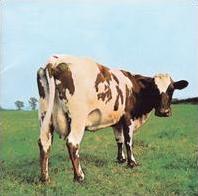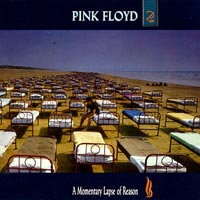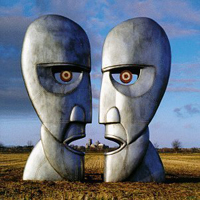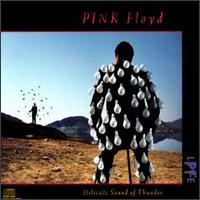 Having finally come to the realization that he is absolutely alone in the world after having failed to form a true connection with his wife or the groupie, Pink lapses into the depressive bout of "Don't Leave Me Now." Perfectly reflected in the sluggish rhythm of the piano and the reverb-laden synthesizers, the reverb itself hinting at the hollowness and void of Pink's life, "Don't Leave Me Now" finds Pink in "the depths…of deprived depravity" (interviewer Tommy Vance, 1979 Roger Waters interview). At first the song seems to follow in the tracks of the few songs before it, wearing its meaning on the surface. Distressed at the thought of his wife's infidelity, Pink gives voice to the plethora of warring emotions teeming within his heart, mind, and soul. In one instant he pleads with his wife not to leave him, not to say that their relationship is over. Seconds later, the rage over being left boils to the surface and Pink threatens to put his wife "through the shredder" or to "beat [her] to a pulp on a Saturday night." It's certainly a shock for most listeners to hear the previously docile Pink (submissive to the point of being non-responsive) not only conjure up brutal images of physical abuse but also relish the thought of meting these very images on his adulterous wife. So is Pink physically abusive to his wife? Are these random beatings that he sings about true? As I mentioned above in "One Of My Turns" concerning Pink's "favorite ax," there is a certain danger to interpreting these lines in a literal context. First and foremost, it must be remembered that this character is uttering these lines at the extremes of his emotional capacity. In "One Of My Turns" he is at the height of his violent rage and now in "Don't Leave Me Now" Pink is at the bottom of the darkest depression. I cannot stress enough how important it is to keep a character's mental state in mind when interpreting, or even reading / listening, to their narrative. Many writers love to use the unreliable narrator, presenting the protagonist's skewed views as truth in order to reveal fully the instability, deceptiveness, or simply playfulness of the main character's mind. I think that is what Waters is doing with Pink at this moment, using these false recollections of beatings in order to show just how far gone Pink's mind really is. Keeping this in mind and judging by the complete absence of spousal abuse
Having finally come to the realization that he is absolutely alone in the world after having failed to form a true connection with his wife or the groupie, Pink lapses into the depressive bout of "Don't Leave Me Now." Perfectly reflected in the sluggish rhythm of the piano and the reverb-laden synthesizers, the reverb itself hinting at the hollowness and void of Pink's life, "Don't Leave Me Now" finds Pink in "the depths…of deprived depravity" (interviewer Tommy Vance, 1979 Roger Waters interview). At first the song seems to follow in the tracks of the few songs before it, wearing its meaning on the surface. Distressed at the thought of his wife's infidelity, Pink gives voice to the plethora of warring emotions teeming within his heart, mind, and soul. In one instant he pleads with his wife not to leave him, not to say that their relationship is over. Seconds later, the rage over being left boils to the surface and Pink threatens to put his wife "through the shredder" or to "beat [her] to a pulp on a Saturday night." It's certainly a shock for most listeners to hear the previously docile Pink (submissive to the point of being non-responsive) not only conjure up brutal images of physical abuse but also relish the thought of meting these very images on his adulterous wife. So is Pink physically abusive to his wife? Are these random beatings that he sings about true? As I mentioned above in "One Of My Turns" concerning Pink's "favorite ax," there is a certain danger to interpreting these lines in a literal context. First and foremost, it must be remembered that this character is uttering these lines at the extremes of his emotional capacity. In "One Of My Turns" he is at the height of his violent rage and now in "Don't Leave Me Now" Pink is at the bottom of the darkest depression. I cannot stress enough how important it is to keep a character's mental state in mind when interpreting, or even reading / listening, to their narrative. Many writers love to use the unreliable narrator, presenting the protagonist's skewed views as truth in order to reveal fully the instability, deceptiveness, or simply playfulness of the main character's mind. I think that is what Waters is doing with Pink at this moment, using these false recollections of beatings in order to show just how far gone Pink's mind really is. Keeping this in mind and judging by the complete absence of spousal abuse  throughout the rest of the album, I personally would say that Pink never physically mistreated his wife. One can argue, and rightly so, that Pink mentally abuses her, belittling her rather than physically beating her to "a pulp" in front of his friends. Perhaps he says these things to justify her leaving him. Perhaps he says them in order to get some amount of revenge on her, using the very thought of beating her to placate his own wounded pride. Whatever one's interpretation of these lines might be, it is most interesting to see how quickly Pink flips from one apparent extreme to the other, wondering where their relationship went wrong before lashing out at the very thing he supposedly held dear.
throughout the rest of the album, I personally would say that Pink never physically mistreated his wife. One can argue, and rightly so, that Pink mentally abuses her, belittling her rather than physically beating her to "a pulp" in front of his friends. Perhaps he says these things to justify her leaving him. Perhaps he says them in order to get some amount of revenge on her, using the very thought of beating her to placate his own wounded pride. Whatever one's interpretation of these lines might be, it is most interesting to see how quickly Pink flips from one apparent extreme to the other, wondering where their relationship went wrong before lashing out at the very thing he supposedly held dear.Along with the rapid shifts in feelings, it is also interesting to note Pink's obliviousness throughout the song in which he blindly asks, "how could you treat me this way?" As I'm sure I've mentioned countless times before, Pink is still ignorant of his liability in the
 formation of the bricks for his wall, believing this whole time that it is the world and everyone in it who have created and continue to create bricks through their injurious relationships with Pink. Accordingly, Pink sees himself as the hapless victim in all of his failed relationships. At his very core he wants to connect with someone, to forge a personal bond with another person, but is unable to leave himself so vulnerable. But rather than realizing that he is as much, if not more, to blame for the distance he creates between himself and the rest of the world, Pink projects each one of his faults onto the external world, blaming everyone except himself for "running away."
formation of the bricks for his wall, believing this whole time that it is the world and everyone in it who have created and continue to create bricks through their injurious relationships with Pink. Accordingly, Pink sees himself as the hapless victim in all of his failed relationships. At his very core he wants to connect with someone, to forge a personal bond with another person, but is unable to leave himself so vulnerable. But rather than realizing that he is as much, if not more, to blame for the distance he creates between himself and the rest of the world, Pink projects each one of his faults onto the external world, blaming everyone except himself for "running away."Not surprisingly, it seems that cycle of Pink's mother's overprotection has come full circle, causing Pink to protect himself from the world almost by means of the same neurotic behavior of his mother. Notice that Pink repeats "oooh babe" throughout the song, a phrase that until now has been uttered numerous times by his mother alone in songs like "The Thin Ice" and "Mother." And so the cycle of obsession continues,
 paralleling such haunting ideas like the mother putting "all of her fears into you" with Pink's equally disturbing threats of putting his wife "through the shredder." Even the image of an actual shredder quite possibly alludes to Pink's childhood education in which the teachers attempted to mold their students into model citizens (the movie scene of "Another Brick In The Wall 2" uses a hamburger shredder to perfectly convey this point). Pink alludes to the shredder here as being an implement of personal humiliation, an instrument that produces submissiveness. Simply put, he fantasizes about molding his wife in much the same way that the teachers tried to mold him. In other words, Pink has adopted both his mother's obsessions as well as his teacher's methods of using humiliation to create the desired product. Pink is becoming the very things that he detests in a cyclical pattern that culminates in his final, corrupt transformation later in the album.
paralleling such haunting ideas like the mother putting "all of her fears into you" with Pink's equally disturbing threats of putting his wife "through the shredder." Even the image of an actual shredder quite possibly alludes to Pink's childhood education in which the teachers attempted to mold their students into model citizens (the movie scene of "Another Brick In The Wall 2" uses a hamburger shredder to perfectly convey this point). Pink alludes to the shredder here as being an implement of personal humiliation, an instrument that produces submissiveness. Simply put, he fantasizes about molding his wife in much the same way that the teachers tried to mold him. In other words, Pink has adopted both his mother's obsessions as well as his teacher's methods of using humiliation to create the desired product. Pink is becoming the very things that he detests in a cyclical pattern that culminates in his final, corrupt transformation later in the album.Heretofore I have been discussing "Don't Leave Me Now" as Pink's degenerate mental address to his adulterous wife. Yet in a 1979 interview with Tommy Vance, Roger Waters states that Pink doesn't sing the song "to anybody; it's not to her [the groupie] and it's not really to his wife, it's kind of to anybody. If you like it's kind of men to women in a way, from that kind of feeling." Generalizing the song in the way Waters does really stresses that Pink's relationship with his wife is seemingly the same as his
 polar love-hate relationship with everything in his life. He loves his father but hates him for dying. He loves his mother but hates her for stifling him. He loves his celebrity but hates it for being so shallow and materialistic. He loves his wife but hates her when she cheats on him. And as we shall see soon enough, he loves his wall for the protection it gives but will eventually hate it for nearly entombing him.
polar love-hate relationship with everything in his life. He loves his father but hates him for dying. He loves his mother but hates her for stifling him. He loves his celebrity but hates it for being so shallow and materialistic. He loves his wife but hates her when she cheats on him. And as we shall see soon enough, he loves his wall for the protection it gives but will eventually hate it for nearly entombing him.The movie scenes accompanying "Don't Leave Me Now" once again depart from simply depicting the ideas conveyed by the lyrics (as seen in the past two songs) and instead offer up many densely packed images. The song begins with a close-up of the debris in Pink's hotel room, littering the screen with shots of broken glass, overturned tables, and smashed guitars. While the chaos might not seem like much out of the ordinary at the moment, I think it is important to note so that the development between this point in time and the ordered chaos depicted later in "Is There Anybody Out There?" can be truly understood. The Christological parallels of "The Thin Ice" depicting Pink floating in a crucified form are furthered here, first with a close-up shot of Pink's blood-soaked hands reminiscent of the stigmata and then with a full screen shot of the "crucified" Pink, his blood dispersing and staining the clear blue water of the swimming pool. This shot is interestingly superimposed over images of Pink's wife and her lover, the faded image of Pink's crucifixion standing out in sharp contrast to the almost animalistic movements of the lovers. Though he is a sort of anti- or mock-Christ, Pink presumably imagines himself otherwise as evidenced in the shots. In his mind, he is a martyr who is betrayed by the sinful acts of a loved one (notice that Pink's wife has red hair, supposedly the same color as Judas Iscariot, the disciple who betrayed Jesus in the Garden of Gethsemane). As a result, he is suffering for their sins by means of his own mental crucifixion, the depressing anguish that he is experiencing because of his wife's transgressions. Though Pink is presented in such
 a light, the audience is far more cognizant of his mock-Christ role, knowing that Pink was not so much betrayed by his wife as he was by himself, that he is only victimized by his own blindness and ignorance.
a light, the audience is far more cognizant of his mock-Christ role, knowing that Pink was not so much betrayed by his wife as he was by himself, that he is only victimized by his own blindness and ignorance.Pink is next shown sitting in a chair watching TV while each splash of blood that falls from his fingers takes on a cataclysmic, Christ like resonance. Despite the apparent ordinary reality of the scene with "the Dambusters" still playing on the television, this scene is quickly revealed to be another one of Pink's hallucinations. Far from the littered screen that opened the song, the room, though sparsely furnished, is still intact just as the TV is still in working condition. The hallucination continues as the shadow of Pink's wife emerges onto the back wall before transforming into a preying mantis, the very name of which creates a hunting / hunted scenario in which Pink, the "hapless victim" is hunted by his wife. The mantis's face soon transforms into the female flower from "Goodbye Blue Sky" which itself is suggestive of a woman's vaginal lips, a "symbol of womanhood" as Gerald Scarfe suggests on the DVD commentary. Pink cowers in the corner, tortured by both the mantis in front of him and the thoughts of his wife's adulterous acts superimposed on the screen. And so the song ends with Pink crouching in the corner, helpless in his mind, surrounded by the massive blue walls that possibly allude to the "baby blue" innocence which he believes he still possesses. In his mind, he is as innocent and unaccountable as the crucified Christ who, according to Christian beliefs, suffered and died on the cross as a result of the world's transgressions. Yet here we find another separation in the characters of Christ and Pink, further supporting the argument that Pink is a mock-Christ rather than a Christ figure. While Christians believe that Jesus gave himself to the world when he died so that all might live, we will see in the next song that Pink takes the opposite course by completely isolating himself from the external world, symbolically sacrificing himself so that he alone might live.
Resurging from the depths of his depression, Pink commits one final violent act before completely isolating himself from the injurious external world. With the rage that has built up over his life, Pink symbolically attacks the burdens that he feels has been placed on him. He destroys the television with one fell swoop of his guitar, striking out against his past afflictions (represented by "the Dambusters" that was playing on the
 TV) and his present burdens (embodied in everything from the materialistic symbol of the television and the surrounding hotel room to his very solitude in the scene). It is also interesting to note that Pink destroys the TV right before the couple on the screen kiss, alluding to his own severed relationships and his inability to truly connect with anyone. In an instant Pink is propelled into the uncharted reaches of mental dementia. (Sursa)
TV) and his present burdens (embodied in everything from the materialistic symbol of the television and the surrounding hotel room to his very solitude in the scene). It is also interesting to note that Pink destroys the TV right before the couple on the screen kiss, alluding to his own severed relationships and his inability to truly connect with anyone. In an instant Pink is propelled into the uncharted reaches of mental dementia. (Sursa)
















Niciun comentariu:
Trimiteți un comentariu